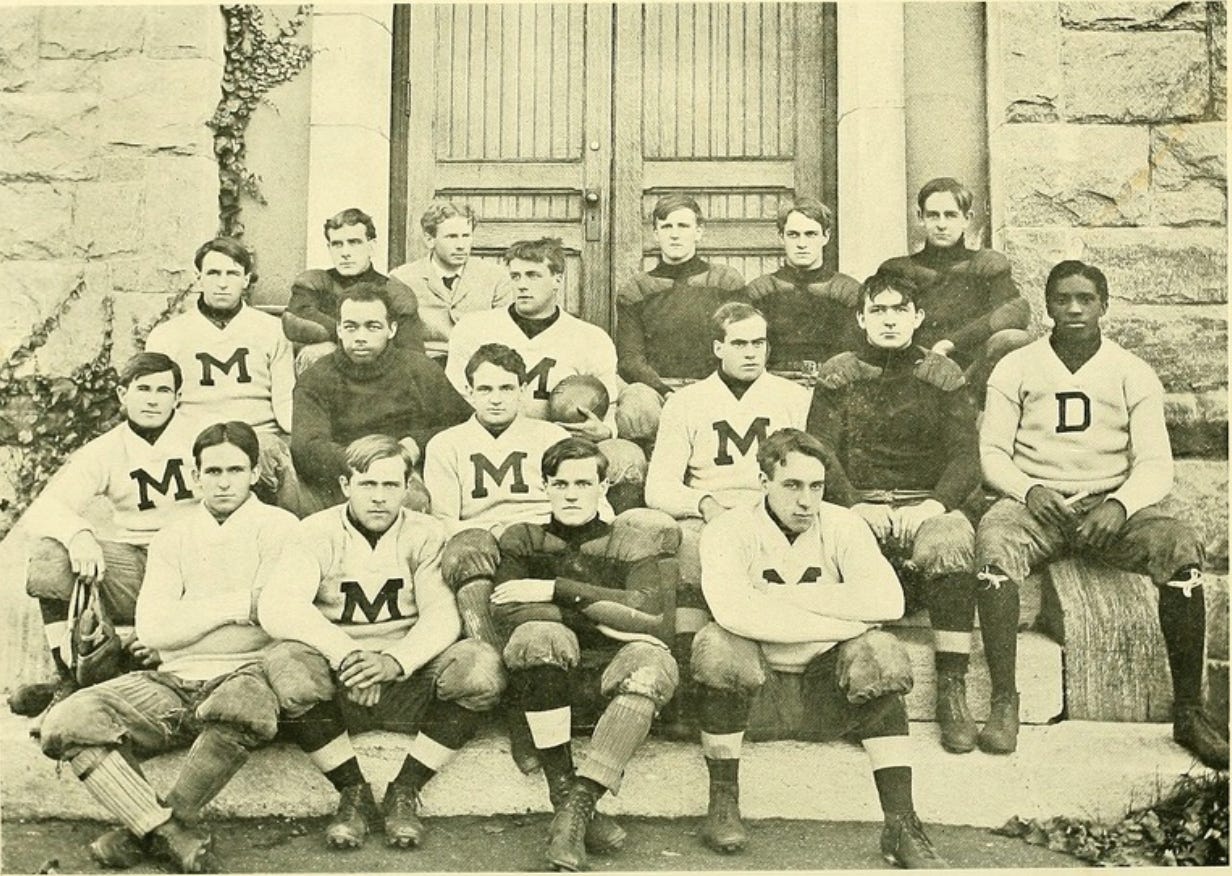Today's Tidbit... The First Black College Football Coach At A Non-HBCU
I and others have previously identified Matthew Bullock as the first Black coach at a predominantly White college. Last year, I wrote a story about Bullock's younger brother, William, who appeared in images of Exeter playing Tufts in 1903. That story included the following passage about Matthew Bullock:
After graduating from Dartmouth, Matthew Bullock went to Harvard Law and coached a high school team and the Massachusetts Agriculture College (now the University of Massachusetts Amherst). As coach of UMass during the 1904, 1907, and 1908 seasons, Matthew Bullock was the first African American to coach football at an integrated or predominantly white college.

As it turns out, the passage is wrong since I recently found another coach who beat Matthew Bullock by one year. Regular readers know that yesterday's Tidbit told the story of the Eastern Coaches of 1903 and included their portraits in a composite image.
The portrait of Colby's coach, Anthony Harris, in the third row far right stood out from the 20 others, as seen in the close-up below.
Follow-up research confirmed elements of Harris' history, though much remains missing. According to the 1880 Census, Harris was born in Cambridge, Massachusetts, in 1879 as the fourth child of James F. Harris, a Black immigrant from the West Indies, and Mary J. Harris, a White immigrant from England.
Harris appears to have grown up in Cambridge and graduated in 1900 from Cambridge Manual Training School (Rindge Tech). Almost a decade earlier, the school also produced William Henry Lewis and William Tecumseh Sherman Jackson, among football's first Black college players.
Harris enrolled at Tufts in 1900, quickly making his way onto the football team. He did not start their first game at Army but was in the lineup the following week at left end versus Yale, which was later named national champions. Pretty tough duty for your first start. Harris started for Tufts off and on the rest of the season and lettered for the Jumbos, but his trail went cold in 1901, and he does not appear to have played for Tufts that season or in 1902.
Harris was then found at Colby in late September 1903. Perhaps he was a late hire -which was not uncommon then- since he arrived a few days before their first game against Brown. Harris became known as an ardent conditioner of his men and ended the season in possession of a gold watch presented to him by the team.
An April 1904 newspaper article indicates the school and team wanted Harris to return for 1904, but he desired more money than they had paid in 1903, which the athletics association was reluctant to offer. One way or the other, there was a meeting of the minds and pocketbooks, and Harris returned to Waterville to coach Colby during the 1904 season.
Colby had an up-and-down season in 1904 as they inserted promising freshmen into the lineup, some of who had not played football before arriving at Colby. Injuries also hampered the team, but they finished 4-3, beating two prep schools, New Hampshire and Maine while losing to Bowdoin, Bates, and Brown.
After the 1904 season, Harris' trail goes cold once again. A WWI Draft Registration form for William Harris, not Arthur William Harris, shows him living in Cambridge and working as a belt maker, and a Social Security form indicates he died in 1945.
I will continue looking for additional information on Harris and provide updates when found, but if anyone has information about him, please comment below. As the earliest identified Black coach at a predominantly White school, Harris deserves recognition for his contribution to football and society.
Football Archaeology is reader-supported. Click here to buy one of my books or otherwise support the site.





